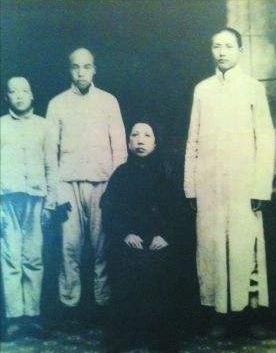
Chairman Mao published more than forty poems from 1906 to 1975, spanning nearly seventy years. The first poem of Mao Zedong's life that I have seen so far is "Five Words Poems and Wells" written when he was 13 years old:
The patio is boxy and surrounded by high walls.
Clear pebbles, small fish in the center.
Drink only the water from the well, and you will never be able to raise it for long.
This poem is as plain as words, that is, it initially reflects Mao Zedong's poetic talent and thought, and also reflects the freedom and dream that an ordinary teenager yearns for, which is similar to Luo Binwang's "The Poetry of the Wing Goose":
Goose Goose Goose,
Curl your neck to the sky.
White hair floating green water,
The red palm plucks the waves.
At the end of 1975, the eighty-three-year-old Mao Zedong wrote his last poem, "Appeal to the Heartfelt Intestines", which is said to be addressed to The Seriously Ill Premier Zhou:
It is precisely when the gods have things to do that they come to the southern kingdom to step on the branches.
Qingsong was furious and sent out to the sky, and the leaves of defeat followed the blue water.
A gust of wind and thunder shocked the world, and the streets were full of red and green flags.
Listening to Xiao Xiaoyu with tranquility, the people of the homeland have some thoughts.
The poem is no longer plain and simple, but somber and depressed. Combined with the background of the poem and the poet's state of mind in his later years, it is not difficult to understand its meaning, which is similar to Du Fu's "Ascending":
The wind was rushing, and the tall apes roared, and the white bird of Nagisa Qingsha flew back.
Boundless falling wood, the Endless Yangtze River rolling in.
Wanli Is often a guest in the autumn and has been sick for more than a hundred years.
Hardship hated the frost sideburns, and poured out the newly stopped cloudy wine glass.
And if Du Fu's poems are called poetic history, then Chairman Mao's poems can also bear this title. His poetry creation is closely integrated with the fate of the times, vividly recording the main lines of various historical periods such as the magnificent Chinese revolution and the construction of new China. Of course, his own talents and ideas are also included, which is very personal and brilliant.
These creations were the immortal spiritual food needed for our national character, cultural self-confidence and struggle and faith, which is why the people of Chinese still miss Chairman Mao to this day.
And with the development of the times, Chairman Mao's personal life has also been more revealed to the world. However, there are very few works in his poems that express the love of his children, but the shots are fine, such as this song that is also well known to everyone, "Butterfly Love Flower Answer Li Shuyi":
I lost my pride and lost my willow,
Willow flutters straight up to the heavy Xiaojiu.
Asking Wu Ganghe everything, Wu Gang held out osmanthus wine.
Lonely Chang'e Shu wide sleeves,
Long and long and loyal to the soul dance.
Suddenly reported that the human world had ambushed the tiger, and the tears flew down as a downpour.
Li Shuyi was a good friend of Yang Kaihui's middle school days, and Li Shuyi's marriage with her husband Liu Zhixun was introduced by Yang Kaihui. Liu Zhixun was also a comrade-in-arms of Mao Zedong in his early years, and later, like the martyr Yang Kaihui, he was unfortunately killed. After liberation, Li Shuyi wrote a letter to Chairman Mao and attached a poem she wrote in honor of her husband, "Bodhisattva Man."
Chairman Mao replied to a letter after reading it and created this poem "Butterfly Loves Flowers". As we all know, Proud Yang refers to the martyr Yang Kaihui. It was only when the original word was first created: I lost the Yang Huajun lost the willow, and later changed it to proud Yang when cursive. He explained: Women's revolution and the loss of their yuan (head), not proud!
Needless to say, Liu naturally refers to the martyr Liu Zhixun, and Yang Liu certainly represents other comrades who sacrificed for the revolution. What is less well known is that Chairman Mao also implied he Zizhen's name in this poem: He Zizhen was born in the season when osmanthus flowers were fragrant, and his nickname was osmanthus flower.
Ruthless may not be really heroic, sentient and righteous husband. This can also be vividly expressed in Chairman Mao's calligraphy works, of which there are rare traces of sketching and smearing. During the period of pouring out the mental journey and true feelings at that time, it can be said that the heart and hand are one, and there is a similarity with Yan Zhenqing's second line of the world.